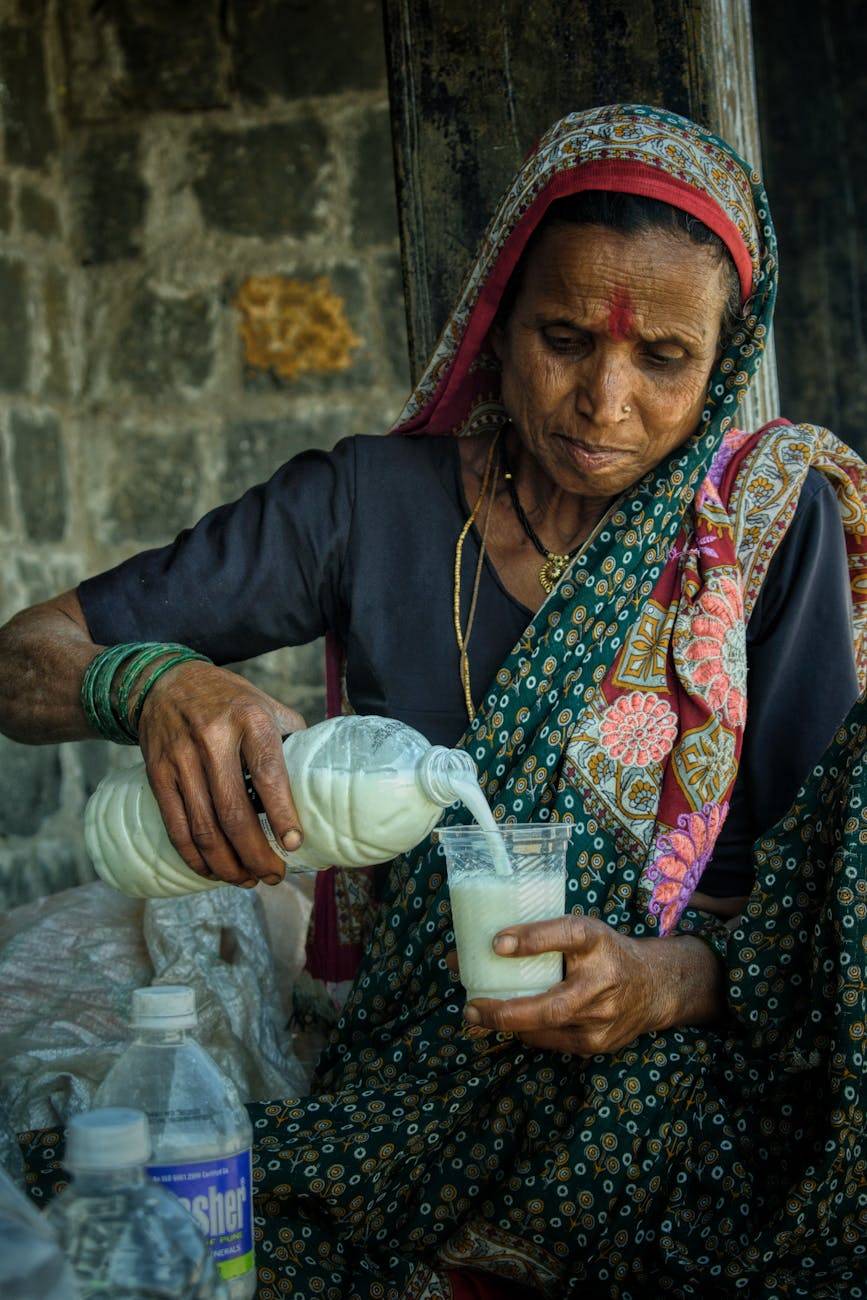Understanding Raw Milk
Before diving into the best sources of local milk, it’s important to understand what raw milk is and the potential health risks and benefits associated with it.
What is Raw Milk?
Raw milk, as the name suggests, is milk that comes directly from cows, goats, sheep, or other animals, without undergoing pasteurization. Pasteurization is a process that heats milk to a specific temperature for a set duration to kill harmful bacteria.
Some proponents of raw milk believe it contains beneficial bacteria and enzymes not found in pasteurized milk. These elements, they claim, offer health benefits such as improved digestion, a strengthened immune system, and a reduced risk of allergies.
Health Risks and Benefits
While raw milk and dairy products made from it might hold certain nutritional benefits, it’s important to weigh these against potential health risks. Raw milk can contain harmful bacteria such as Salmonella, E. coli, and Listeria, which can lead to serious illness (The Dairy Alliance). The Centers for Disease Control and Prevention (CDC) recommends consumers to only consume pasteurized milk and milk products to lower their risk of foodborne illnesses.
On the other hand, raw milk advocates argue that it’s healthier than pasteurized milk. They assert that it contains beneficial bacteria and enzymes that pasteurization destroys. However, it’s important to note that these claims are not fully supported by scientific evidence (The Dairy Alliance).
Knowing these facts, consumers can make an informed decision about whether raw milk is right for them. For those interested in exploring raw milk sources, we can help you find raw milk near me or where to buy raw milk.
Pasteurization and Raw Milk
When seeking out ‘local milk near me’, it’s crucial to understand the difference between pasteurized and raw milk. Pasteurization is a key process that can affect the safety of the milk you consume.
The Pasteurization Process
Pasteurization is a method of heating milk to a specific temperature for a set duration to kill harmful bacteria. This process, named after the French scientist Louis Pasteur, is designed to make milk safe for consumption by eliminating potentially dangerous microbes such as Salmonella, E. coli, and Listeria (The Dairy Alliance). The primary goal of pasteurization is to reduce the risk of foodborne illnesses associated with the consumption of raw milk.
Pasteurized vs Raw Milk
Raw milk is milk that has not undergone the pasteurization process. While it might be appealing to some due to its perceived natural and unprocessed state, raw milk can contain harmful bacteria, including Salmonella, E. coli, and Listeria. These bacteria can cause serious illnesses, especially in individuals with weakened immune systems, the elderly, pregnant women, and children.
On the other hand, pasteurized milk has been treated to kill these harmful bacteria, making it a safer option for consumption. The Centers for Disease Control and Prevention (CDC) recommends that consumers only consume pasteurized milk and milk products to reduce the risk of foodborne illnesses.
When looking for ‘local milk near me’, consider the safety implications of your choice. Whether you’re searching for raw milk, organic raw milk, or pasteurized milk, it’s important to be informed about the processes involved and the potential risks. If you decide to consume raw milk, ensure you’re purchasing from reputable local farms and follow proper storage and handling procedures to minimize potential risks.
Finding Raw Milk Locally
Finding raw milk locally can seem challenging, but with the right resources and knowledge, it’s easier than you think. Whether you’re looking for ‘local milk near me’ or ‘organic raw milk near me’, this section will guide you to the best sources.
Farms and Retailers
The most direct way to purchase raw milk is from local farms and retailers. According to a global survey, there are currently 3719 raw milk sources listed in 49 countries worldwide (GetRawMilk.com). If you’re lucky, you might find a raw milk farm near me or a retailer that sells raw milk brands. However, it’s important to note that local farms selling raw milk are required to have warning labels on their products to inform consumers of potential risks associated with consuming raw milk (The Dairy Alliance).
Another way to source raw milk is from Community Supported Agriculture (CSA) programs or farmer’s markets. These platforms often connect consumers to local milk providers, ensuring you have access to fresh, local milk. Refer to our raw milk delivery section to find services that can deliver fresh raw milk straight to your doorstep.
Online Directories for Raw Milk
In today’s digital age, online directories are an efficient tool to find ‘local milk near me’. Websites like GetRawMilk.com and Real Milk provide comprehensive lists of raw milk sources globally. These directories can help you find a raw milk farm, organic raw milk source, or even a fresh cow milk near me provider.
Before purchasing from any source, ensure to check their credentials, read reviews, and if possible, visit the farm personally. This will not only ensure you’re getting high-quality raw milk but also supports local businesses and promotes sustainable farming practices.
In summary, finding raw milk locally is a task that requires a bit of research and due diligence. However, the result of savoring fresh, rich, and nutritious milk is well worth the effort. Happy hunting for your ‘local milk near me’!
Regulations Around Raw Milk
When searching for ‘local milk near me’, it’s important to be aware of the regulations surrounding the sale and consumption of raw milk. These regulations vary greatly from state to state and country to country.
State-By-State Regulations
In the United States, the rules for selling raw milk are dictated by state laws. For instance, in Virginia, it is illegal to sell raw milk for human consumption unless it has been pasteurized.
Meanwhile, in Canada, the sale of unpasteurized (raw) milk is not allowed due to safety concerns that may cause illness. Consumers are advised to ask if milk from a farm or farmer’s market has been pasteurized (Unlock Food).
To help you navigate these regulations and find the best sources of raw milk near you, we’ve created a raw milk finder. This tool provides up-to-date information on local farms, retailers, and delivery services that comply with the relevant state and federal laws.
Labeling Requirements
In addition to sales regulations, there are also specific labeling requirements for raw milk. Local farms that sell raw milk are required by law to clearly label their products, informing consumers of the potential risks associated with consuming raw milk (The Dairy Alliance).
According to Virginia regulations, the milk containers used for direct sales must be labeled with the name and address of the dairy farm, the date of the milk’s bottling, and a statement that the milk has not been pasteurized. Furthermore, the permitted dairy farm must maintain records of sales and inspections for a period of two years (Virginia Law).
Whether you’re searching for raw milk delivery, organic raw milk near me, or raw milk for sale, understanding these regulations and requirements can help ensure that you’re making safe and informed choices about your dairy purchases.
Nutritional Content of Milk
When seeking out the best local milk near me, it’s paramount to consider the nutritional content. Milk is a rich source of nutrients and plays a vital role in a balanced diet.
Essential Nutrients in Milk
All types of cow’s milk, both regular and organic, offer the same 16 essential nutrients such as calcium, vitamin D, protein, vitamin B12, and vitamin A. The only difference between the types of cow’s milk in the grocery store is the amount of fat (Unlock Food).
| Essential Nutrient | Role in the Body |
|---|---|
| Calcium | Vital for healthy bones and teeth |
| Vitamin D | Helps the body to absorb calcium |
| Protein | Essential for growth and repair of body tissues |
| Vitamin B12 | Important for nerve function and the production of red blood cells |
| Vitamin A | Key for good vision and immune function |
Comparing Organic and Regular Milk
When comparing organic and regular milk, it’s crucial to note that while both types provide the same essential nutrients, organic milk may have higher levels of certain beneficial compounds. According to EatingWell, organic milk may have higher levels of omega-3 fatty acids, vitamin E, and beta-carotene compared to regular milk.
| Nutrient | Organic Milk | Regular Milk |
|---|---|---|
| Omega-3 fatty acids | Higher levels | Lower levels |
| Vitamin E | Higher levels | Lower levels |
| Beta-carotene | Higher levels | Lower levels |
Moreover, production methods differ for organic and regular milk. Organic milk is produced without the use of synthetic pesticides, GMOs, or hormones, while regular milk may come from cows that have been treated with growth hormones and antibiotics.
However, it’s worth noting that regular milk is typically cheaper than organic milk, which can be a determining factor for many people when choosing between the two.
In conclusion, whether you choose to buy regular or organic raw milk, rest assured that both types offer a plethora of essential nutrients that contribute to a healthy diet. However, if you prefer milk with higher levels of certain nutrients and produced without synthetic additives, organic milk may be the ideal choice for you. Always remember to check for quality and safety when buying raw milk for sale near me.
Supporting Local Dairy Farms
When looking for ‘local milk near me’, it’s essential to recognize the benefits of supporting local dairy farms and understanding how to ensure the quality and safety of the products you purchase.
Benefits of Buying Local Milk
Purchasing milk from local dairy farms brings numerous advantages. For starters, it provides an opportunity to purchase fresh, high-quality milk directly from the source, supporting local farmers and the local economy (WikiHow). Additionally, buying local helps reduce the carbon footprint associated with transportation and packaging of commercially-sold milk, promoting a more sustainable and eco-friendly approach to dairy consumption.
Local dairy farms often offer a wider variety of milk products, such as raw milk, organic milk, or specialty flavors that you may not find in regular supermarkets. This variety caters to diverse tastes and dietary preferences, enhancing the overall milk-drinking experience. Moreover, purchasing milk from local dairy farms allows consumers to connect with the farmers and learn about their farming practices. This transparency fosters confidence in the product’s quality and safety.
In some cases, local dairy farms may even offer opportunities for customers to tour the farm and see firsthand how the milk is produced. This promotes education and awareness about sustainable farming practices, enriching the connection between consumers and their food sources.
How to Ensure Quality and Safety
Ensuring the quality and safety of the milk you purchase from local dairy farms is crucial. Dairy products are required to provide a plant number on their label, allowing the milk to be tracked back to the processing plant where it was pasteurized and packaged. This traceability ensures the product’s origin and safety (Barstow’s Longview Farm).
When buying milk locally, it’s also important to consider the farm’s reputation and farming practices. Farms that prioritize sustainable practices and animal welfare are likely to produce high-quality, safe products. It’s always a good idea to ask questions and learn more about the source of your milk.
Locally sourced milk can be found at several grocery stores and small regional chains and shops. For example, Cabot is a cooperative brand owned by family farmers in New England. When you buy Cabot, you’re supporting local farmers, green space, sustainable practices, animal welfare, and the local economy.
Whether you’re searching for raw milk, organic milk, or just fresh, high-quality milk, supporting local dairy farms is a great way to ensure you’re getting the best product while also contributing to your local economy and promoting sustainable farming. So next time you’re looking for ‘local milk near me’, consider the benefits of buying local.




Leave a Reply